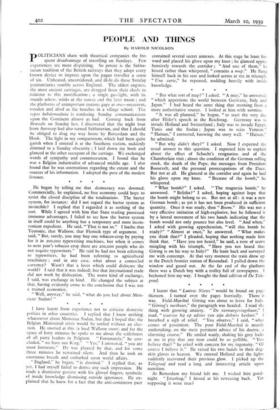He began by telling me that democracy was doomed. Commercially,
he explained, no free economy could hope to resist the closed discipline of the totalitarians. The barter system, for instance: did I not regard the barter system as invincible? I replied that I regarded it as nothing of the sort. While I agreed with him that State trading possessed immense advantages, I failed to see how the barter system in itself could be anything but a temporary and most incon- venient expedient. He said, "That is not so." I loathe that Teutonic, that Walloon, that Flemish type of argument. I said, "But, surely, you may buy one tobacco-crop by paying for it in 200,000 typewriting machines, but when it comes to next year's tobacco crop there are 200,000 people who do not require typewriters." He said he had not been referring to typewriters, he had been referring to agricultural machinery ; and in any case, what about a contro:led currency? Wasn't that a lever which could dislocate the world? I said that it was indeed; but that international trade did not work by dislocation. The worst kind of exchange, I said, was exchange in kind. He changed the subject at that, having evidently come to the conclusion that I was not a trained economist.
"Well, anyway," he said, "what do you feel about Mon- sieur Sudan? "










































 Previous page
Previous page